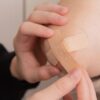Hair transplants are a popular way to treat hair loss. However, before you undergo this procedure, it’s important to understand what to expect. The surgeon will cleanse your scalp and numb the back of your head. Once the grafts are firmly in place, you can resume normal showering and shampooing.
Recovery
Hair transplants can be very painful, so you must take the time to recover from the surgery properly. It can involve taking pain medications and following the instructions from your hair transplant doctor NYC for healing. After the surgery, you may experience some swelling of your scalp and forehead. It is normal and will go away with time.
It is important to avoid bending over for a few days after your surgery, as this can cause bleeding. It would help if you also avoided smoking, as this can interfere with blood flow to the scalp. You can wash your scalp starting day two after the surgery, but only gently using the shampoo you were given. A moisturizer on the scalp is also a good idea to help soften crusts and scabs.
Medications
Men and women who experience stable or random hair loss or thinning may find FUT hair transplant New York City an excellent alternative. They’re also an option for people who want to add thickness and density to their natural hair.
Many people now choose hair transplants to regain their full head of hair because of technological advancements and expert doctors. The results could change your life if you look younger and have more confidence.
FUE hair transplants New York City and FUE are successful hair transplants procedures that provide long-lasting results, but which one is best for you might be difficult to determine as there are numerous factors to consider.
A surgeon creates a flap of skin on the scalp and inflates it with saline, encouraging the area to grow more tissue. When the flap has enough extra skin, it’s moved to a new location and stitched in place. After the procedure, it’s important to keep your scalp clean and follow instructions from your doctor.
Your doctor may recommend a shampoo with a low pH value and is antibacterial, which will help prevent infection and promote regrowth. They may also prescribe medicine that can treat new hair loss and thinning.
Hair Transplants Swelling:
Swelling can occur in the area of your scalp where Hair transplants was performed. This edema can cause discomfort, especially affecting the forehead and eye area. It usually peaks at about day four and will start to go away on its own after that time. A 45-degree tilt is ideal for sleeping with your head up to promote fluid drainage and lessen puffiness. Using an ice pack can also help.
Your doctor may prescribe a low-dose steroid tablet to help reduce swelling. Avoid strenuous activity that increases blood flow to the scalp, which can irritate or dislodge the grafts. Smoking can also slow healing and make it more difficult for the grafts to take. Clean the skull and hair gently, following your doctor’s instructions.
Discomfort:
Most patients experience minimal discomfort, usually lasting only a day or two. You can expect some tingling and itching, but these sensations should subside as the healing continues. You should avoid rubbing your scalp or touching the graft area, which can lead to bleeding and irritation. Instead, it would help if you gently cleaned your skull following the specific instructions given to you by your surgeon.
It will help speed up the healing process and prevent scabbing. It’s also important to follow your doctor’s dietary advice, as this can help prevent infection and accelerate hair growth. Smoking should also be avoided because it may result in problems like constricted blood vessels in the scalp. Sleeping with your head on a pillow is also a good way to reduce swelling.
Results:
During the first month, you may notice that your transplanted hair is shedding. It is normal, and it makes room for new growth. In 4 to 5 months, you should start seeing permanent results.
After the operation, your doctor will give you detailed instructions on how to care for your scalp, including what to wash it with and how frequently. It is important to follow these instructions to protect your transplanted hair from infection and irritation.
Avoid bending over, as this can interfere with blood flow to your head and could dislodge the tiny hair follicles that are growing. It would help if you also avoided smoking, as it can slow healing and affect the appearance of your transplanted hair.










